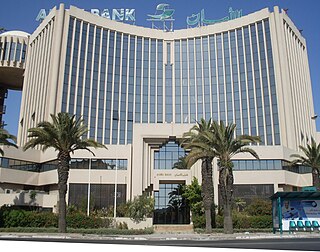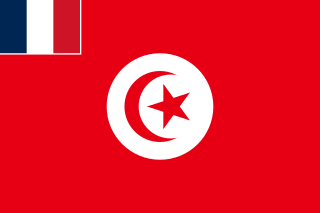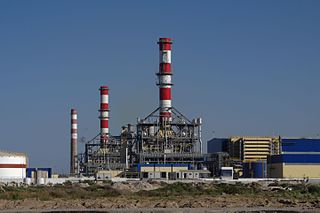Related Research Articles

Tunisia, officially the Republic of Tunisia, is the northernmost country in Africa. It is a part of the Maghreb region of North Africa, bordered by Algeria to the west and southwest, Libya to the southeast, and the Mediterranean Sea to the north and east. It features the archaeological sites of Carthage dating back to the 9th century BC, as well as the Great Mosque of Kairouan. Known for its ancient architecture, souks and blue coasts, it covers 163,610 km2 (63,170 sq mi), and has a population of 12.1 million. It contains the eastern end of the Atlas Mountains and the northern reaches of the Sahara desert; much of its remaining territory is arable land. Its 1,300 km (810 mi) of coastline include the African conjunction of the western and eastern parts of the Mediterranean Basin. Tunisia is home to Africa's northernmost point, Cape Angela; and its capital and largest city is Tunis, which is located on its northeastern coast, and lends the country its name.

The economy of Tunisia is in the process of being liberalized after decades of heavy state direction and participation in the country's economy. Prudent economic and fiscal planning has resulted in moderate but sustained growth for over a decade. Tunisia's economic growth historically has depended on oil, phosphates, agri-food products, car parts manufacturing, and tourism. In the World Economic Forum Global Competitiveness Report for 2015–2016, Tunisia ranks in 92nd place. Based on HDI latest report, Tunisia ranks 96th globally and 5th in Africa.

Popular Unity Movement, is a socialist political party in Tunisia.
The Kore University of Enna, in Italian Università Kore di Enna, is a university founded in 2004 in Enna, the capital city of the Province of Enna, in the center of Sicily and has been visited by two Italian Presidents. The university has very modern facilities; it also has a strong relationships with governments and universities of the Mediterranean Sea countries and with some of European and U.S. areas.

The Ninth Tunisia Plan was an economic development plan implemented by the government of Tunisia from 1996 to 2001.
The Fourth Tunisia Plan was an economic development plan and realignment of foreign policy implemented by the government of President Habib Bourguiba from 1973 to 1976.
The Third Tunisia Plan was an economic development plan implemented by the government of President Habib Bourguiba from 1969 to 1972.
The Seventh Tunisia Plan was an economic development plan implemented by the government of Tunisia from 1986 to 1990.
The Fifth Tunisia Plan was an economic development plan implemented by the government of Tunisia from 1977 to 1981.
The Second Tunisia Plan was an economic development plan implemented by the government of President Habib Bourguiba from 1965 to 1968.

The following outline is provided as an overview of and topical guide to Tunisia:
Of the religions in Tunisia, Islam is the most prevalent. It is estimated that approximately 99% of Tunisia's inhabitants identify themselves as Muslims.

The French protectorate of Tunisia, commonly referred to as simply French Tunisia, was established in 1881, during the French colonial Empire era, and lasted until Tunisian independence in 1956.

The Tunisian Revolution, also called the Jasmine Revolution, was an intensive 28-day campaign of civil resistance. It included a series of street demonstrations which took place in Tunisia, and led to the ousting of longtime president Zine El Abidine Ben Ali in January 2011. It eventually led to a thorough democratisation of the country and to free and democratic elections.
Operation Tunisia refers to the actions by internet group Anonymous during the Tunisian revolution.

The Assembly of the People's Representatives is Tunisia's legislative branch of government. The unicameral Assembly replaced the Constituent Assembly and was first elected on 26 October 2014. The legislature consists of 217 seats. Before the 2011 revolution, Tunisia's parliament was bicameral and consisted of an upper chamber called the Chamber of Advisors and a lower chamber called the Chamber of Deputies.

On 18 March 2015, two militants attacked the Bardo National Museum in the Tunisian capital city of Tunis, and took hostages. Twenty-one people, mostly European tourists, were killed at the scene, and an additional victim died ten days later. Around fifty others were injured. The two gunmen, Tunisian citizens Yassine Labidi and Saber Khachnaoui, were killed by police. Police treated the event as a terrorist attack.

On 26 June 2015, a mass shooting occurred at the tourist resort at Port El Kantaoui, about 10 kilometres north of the city of Sousse, Tunisia. Thirty-eight people, 30 of whom were British, were killed when a gunman, Seifeddine Rezgui, attacked a hotel. It was the deadliest non-state attack in the history of modern Tunisia, with more fatalities than the 22 killed in the Bardo National Museum attack three months before. The attack received widespread condemnation around the world. The Tunisian government later "acknowledged fault" for slow police response to the attack.

The energy sector in Tunisia includes all production, processing and, transit of energy consumption in this country. The production involves the upstream sector that includes general oil and gas, the downstream sector that includes the only refinery in Tunisia and most of the production of natural gas, and varied electrical/renewable energies. Renewable energy has been a strong point of focus for Tunisia as they look to optimize their green energy sources and advance their developing country. The Tunisian government has partnered with Russia and France in hopes of establishing nuclear energy as a viable alternative to fossil fuels and taking up a nontrivial chunk of the energy production in Tunisia. This is expected to be accomplished in the 2020s.

Kais Saied is a Tunisian politician, jurist, and retired law professor currently serving as the 8th President of Tunisia since October 2019. He was president of the Tunisian Association of Constitutional Law from 1995 to 2019.
References
- 1 2 Jamal, Vali (1991). Tunisia: Rural Labour and Structural Transformation . pp. 2. ISBN 9780415042741.